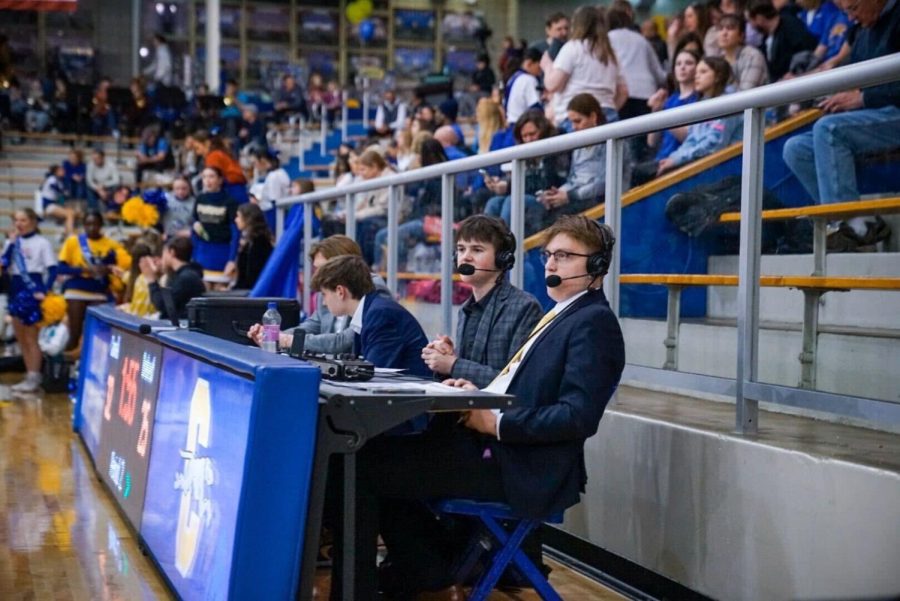Michele Tafoya, who was a sideline sports commentator for NBC for 11 years, retired recently after two years of it being on her mind. However, some, like The Sporting News, speculate her retirement is actually the result of some controversial opinions she expressed on “The View” about the COVID-19 pandemic, critical race theory, political activist and former NFL player Colin Kaepernick.
At Carmel high school (CHS), radio and television advisers said they don’t have as many concerns about student commentators voicing opinions like Tafoya’s. Rather, Radio teacher Dominic James said if a student sports commentator says something controversial on air, it is more likely because they said something not impartial or expressed sadness over the ending of a game.
“Sometimes a student can sound too disappointed if we have lost, and it comes across as bad sportsmanship,” James said. “That’s not very good because not only is it not impartial, but actually you’re getting too emotional, and, of course, we want all our announcers to be in control of what they’re saying.”
Connor Gratigny, sports commentator for WHJE and junior, said he thinks the main area sports commentators should avoid talking about is personal opinions about the players and referees.
“If you have a personal opinion of maybe something that’s going on, like a ref that’s calling the game, or just a play, you really shouldn’t be talking about that that much,” Gratigny said. “The people listening don’t really want to hear about what you think of the play.”
Additionally, when editing videos, Aissatou Diatta, CHTV student and sophomore, said it is important that they avoid showing injuries.
“A big thing is not showing injuries on broadcasts, as it’s something that can be pretty serious and traumatic, so we avoid showing it out of respect for the player and the family,” Diatta said.
When students do end up saying something controversial on air, James said to maintain credibility, it is important for broadcasters to acknowledge what happened and try to make amends.
“While (saying something controversial) is very rare, it has occasionally happened over the years,” he said. “We apologize immediately and that sort of thing, and there is usually a consequence for that student as well, because they have not been professional, therefore they may be denied broadcasting rights for a period of time.”
Gratigny believes there are ways for sports commentators to deal with their emotions while broadcasting so they can avoid saying impartial things on air.
Gratigny said he “would probably focus on just catching up on the game, maybe pass it over to my color (another commentator) instead of talking more about the refs, or if it was a bad call, bad play.”
In the end, James said it is up to reporters to judge what is appropriate to say in the moment.
“It’s essentially (the commentator’s) choice about what they want to talk about,” James said. “But in terms of good journalism and good broadcasting, we want our students to be impartial as much as possible.”
Gratigny said he agreed, and said staying professional on air is one way to combat making possibly controversial remarks.
“I think that when you’re on air, you want to show a sign of professionalism, you want to be mature,” Gratigny said. “You don’t want to be putting anyone really down, or anything, you want to be focusing on what’s going on in the game.”

































![AI in films like "The Brutalist" is convenient, but shouldn’t take priority [opinion]](https://hilite.org/wp-content/uploads/2025/02/catherine-cover-1200x471.jpg)









































![Review: “The Immortal Soul Salvage Yard:” A criminally underrated poetry collection [MUSE]](https://hilite.org/wp-content/uploads/2025/03/71cju6TvqmL._AC_UF10001000_QL80_.jpg)
![Review: "Dog Man" is Unapologetically Chaotic [MUSE]](https://hilite.org/wp-content/uploads/2025/03/dogman-1200x700.jpg)
![Review: "Ne Zha 2": The WeChat family reunion I didn’t know I needed [MUSE]](https://hilite.org/wp-content/uploads/2025/03/unnamed-4.png)
![Review in Print: Maripaz Villar brings a delightfully unique style to the world of WEBTOON [MUSE]](https://hilite.org/wp-content/uploads/2023/12/maripazcover-1200x960.jpg)
![Review: “The Sword of Kaigen” is a masterpiece [MUSE]](https://hilite.org/wp-content/uploads/2023/11/Screenshot-2023-11-26-201051.png)
![Review: Gateron Oil Kings, great linear switches, okay price [MUSE]](https://hilite.org/wp-content/uploads/2023/11/Screenshot-2023-11-26-200553.png)
![Review: “A Haunting in Venice” is a significant improvement from other Agatha Christie adaptations [MUSE]](https://hilite.org/wp-content/uploads/2023/11/e7ee2938a6d422669771bce6d8088521.jpg)
![Review: A Thanksgiving story from elementary school, still just as interesting [MUSE]](https://hilite.org/wp-content/uploads/2023/11/Screenshot-2023-11-26-195514-987x1200.png)
![Review: "When I Fly Towards You", cute, uplifting youth drama [MUSE]](https://hilite.org/wp-content/uploads/2023/09/When-I-Fly-Towards-You-Chinese-drama.png)
![Postcards from Muse: Hawaii Travel Diary [MUSE]](https://hilite.org/wp-content/uploads/2023/09/My-project-1-1200x1200.jpg)
![Review: "Ladybug & Cat Noir: The Movie," departure from original show [MUSE]](https://hilite.org/wp-content/uploads/2023/09/Ladybug__Cat_Noir_-_The_Movie_poster.jpg)
![Review in Print: "Hidden Love" is the cute, uplifting drama everyone needs [MUSE]](https://hilite.org/wp-content/uploads/2023/09/hiddenlovecover-e1693597208225-1030x1200.png)
![Review in Print: "Heartstopper" is the heartwarming queer romance we all need [MUSE]](https://hilite.org/wp-content/uploads/2023/08/museheartstoppercover-1200x654.png)




